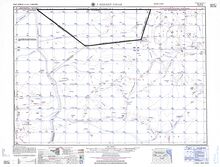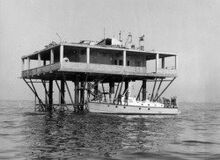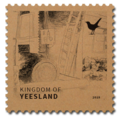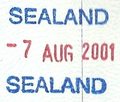Micronation
A micronation[a] is, broadly speaking, any self-proclaimed sovereign state without international recognition that is treated differently to a state with limited recognition. There is no widely accepted consensus on the definition of a micronation within the field of micropatriology. Geographically, most micronations are very small, are often the outgrowth of a single individual, rely on their sovereign state (macronation) to some extent, and mimic nation-states by proclaiming national symbols—such as a flag—and issuing coins, banknotes or passports. Micronations can be founded for a variety of reasons, including discontent with one's country, personal entertainment, theoretical experimentation, protest, artistic expression, satire, tourism and the conduct of criminal activity. Most micronational claims are considered trivial enough to be ignored by the sovereign states whose territory they claim.
Termed in at least 1976, several historical states founded in the 19th and early 20th centuries have retroactively been called micronations. Between 1960 and 1970, the number of micronations began to increase, with large developments made in Australia in the 1970s and in Japan and New Zealand in the 1980s. The growing popularity of the Internet starting in 1995 allowed micronational communities—called sectors—to form online. As a result, micronationalism lost much of its traditionally eccentric anti-establishment sentiment in favour of more hobbyist perspectives, and the number of exclusively online micronations—and the number of micronations in general—expanded dramatically. Starting in 2003,several intermicronational summits have taken place (ex: Microcon)
Etymology

The etymology of micronation is unclear, but it dates back to at least the 1970s.[3] The word itself is analysable through surface etymology as a combination of the adjective micro- (from New Latin, from the Greek μικρός mikrós)[4] and nation (from the Latin natio),[5][6] literally meaning "small nation".[7][8]
The earliest attested use of micronation in its current meaning is in an article by The New York Times on 28 March 1976. The first use of micronation in a book was in the 1978 The People's Almanac #2 by David Wallechinsky and Irving Wallace.[9] The chapter "Nations and their Rulers" includes three sections consisting of lists—a list of sovereign states ("From Afghanistan to Zimbabwe"),[10] countries that are "Most Likely to Secede,"[11] and lastly "Micronations,"[12] which includes multiple micronations such as the Republic of Minerva, Principality of Sealand and the Principality of Hutt River.[13] The unconventional work, which "incorporates, under old and new headings, hundreds of ideas and information contributed by readers"[14] formally recognised micronations as separate entities to secessionist states.
The International Micropatrological Society, founded in 1973, coined micropatriology (or micropatrology) as the study of micronations by erroneously believing it to be "the study of small countries."[15] In actuality, patriology (from Greek πατέρας patéras) means "father."[16] One micropatriologist suggested that they were intended to mean the "study of small fatherlands." Micropatriologist Ives Blackwood hypothesised—possibly without the knowledge of the existence of the International Micropatriological Society—that the word was derived from micropatriotism, a calque formed by analysis of micronationalism as micro- + nationalism. Micropatriologist Zabëlle Skye further hypothesised that as the International Micropatriological Society coined micropatriology before micronation was in use could perhaps indicate that micronation may have been inspired from micropatriology.
According to Skye, micronation was first used—albeit uncommonly—to refer to unrecognised breakaway states in Sub-Saharan Africa during the decolonisation of Africa in the mid-1960s to 1975.[9] Skye further explains that the earliest documented use of micronation to refer to an unrecognised nation-state was in a translation by the United States Joint Publications Research Service of a 1967 Russian-language work by V. I. Iordanskiy in which he used the term micronationalism.[9][17] It was used in regard to the Katanga Province's breakaway state, the State of Katanga, from the Belgian Congo during the Congo Crisis which existed between 1960 and 1963:
Their separatist feelings, carefully supported by interested western circles, are still strong. The Lunda "micronationalism," which was displayed during the time of the famous Katanga independence in the bloody pogroms over the Luba which supported the principle of Congo unity, remains a major obstacle on the way to the real integration of Katanga.
— V. I. Iordanskiy, 1967 [translated by the United States Joint Publications Research Service]
The term was used three years earlier by President of Senegal Léopold Sédar Senghor in the first issue of his French-language Liberté in 1964, in which he calls Senegal a micronation[18] despite it having been granted independence from France four years prior. Micronation was first used in English in the 1969 Nation-Building in Africa: Problems and Prospects by Arnold Rivkin of Rutgers University Press,[19] while the first breakaway state outside of Africa to be called a micronation was Bougainville Island (today part of Papua New Guinea) in 1973 in Alternative Strategies for Papua New Guinea by A. Clunies Ross and John Langmore of Oxford University Press.[20]
Micronation is absent from Erwin Strauss's 1979 How to Start Your Own Country[21] about micronations—as well as its 1984 and 1999 editions—thus indicating that the term may not have picked up mainstream usage until much later.
Launched in 1995 during the rise of micronationalism on the Internet, Robert B. Madison's the Micronations Page may have helped to popularise the neologism to a wider audience. Since 2000, micronation has been widely accepted in journalism and academics outside of the micronational community, with the term appearing in several major dictionaries.[22][23][24]
Definition and types
- See also: Secessionism and Classification of micronations
There is no widely accepted definition of what constitutes a micronation within the field of micropatriology. Two common definitions in academics and journalism of a micronation is generally a self-proclaimed sovereign state that lacks a legal basis for its existence or an entity that claims to be a sovereign state but is not recognised as such by any other government or major international organisation. However, these publications often contradict themselves, as they state that micronations are different from states with limited recognition (such as the Sahrawi Arab Democratic Republic, Republic of South Ossetia – the State of Alania or the Republic of Kosovo), however both micronations and such states fit the latter definition—a self-proclaimed sovereign state without recognition.
Micronations are aspirant states. Academics Harry Hobbs and George Williams define them as "self-declared nations that perform and mimic acts of sovereignty, and adopt many of the protocols of nations, but lack a foundation in domestic and international law for their existence and are not recognised as nations in domestic or international forums." In general, micronations are distinct from true secessionist movements—in that they often do not actively challenge their macronation—quasi-states (proto-states), tribal nations, Indian reservations, clans, ecovillages and fictional countries. While some micronations seek to eventually achieve statehood, they cannot actively pursue it due to their small number of citizens. Since the rise of the Internet in 1995, micronations have become increasingly hobbyist or tongue-in-cheek.
Some states, like the Free Republic of Liberland, erstwhile Hutt River and historically Sealand, go to great lengths to present themselves as fully independent sovereign states, often causing conflicts with macronational authorities over issues such as taxation. Others such as the Empire of Austenasia, Royal Republic of Ladonia and Empire of Atlantium publicly present themselves as sovereign states, but include tongue-in-cheek features or may privately admit to the futility or impossibility of attaining internationally recognised independence. Adaptations are made to conform with most aspects of macronational laws in order to avoid conflict. Lastly, on the end of the traditional secessionist spectrum, micronations like the Republic of Molossia, Protectorate of Westarctica and Grand Duchy of Flandrensis officially claim sovereignty, but openly acknowledge their status as micronations and may include satirical or jocular elements.
Micronations laying claim to the sea, extraterrestrial land, fictional places, cyberspace, objects or generally unconventional places are often seen as less serious, hobbyist or satirical in nature. Though rejected by micropatriology, non-micronationalist academics and journalists may classify these as micronations.
Classical micropatriology
Classical micropatriology is a paradigm of micropatriology developed in the early 2010s that states that there is a two-dimensional divide between simulationism and secessionism; in its broadest sense, simulationists do not seek statehood and wish to act more as a political or cultural simulation, while secessionists formally claim independence and wish to seek statehood. Classical micropatriology is most commonly held in the MicroWiki sector, where it originated, and is also found in the Facebook sector—where simulationism is generally denounced—and the Reddit Sector.
Territorial claims



Micronations generally claim land that they own or can administer, such as their own property. Others claim unpopulated areas such as landscapes, public parks, beaches or unpopulated islands. Claiming populated places without the knowledge or consent of the residing individuals is often frowned upon by the micronational community or seen as a non-serious and unrealistic claim. Some neighbourhoods and towns have declared independence as sovereign states, including the Maritime Republic of Eastport, Le Royaume de L'Anse-Saint-Jean and Republic of Rathnelly.
Bir Tawil and Antarctica
Several micronations have claimed territory in Bir Tawil and Antarctica (especially Marie Byrd Land), which are considered terra nullius. The former located between Egypt and Sudan is a 2,060 km2 (800 sq mi) landlocked territory, which was created from a discrepancy between borders drawn in 1899 and in 1902. Due to the remoteness and hostile climate of the region, the vast majority of micronational claims have been made by declarations posted online, without the declarer physically entering the area. One of the exceptions is the Kingdom of North Sudan, which its founder, Jeremiah Heaton, visited in 2014 so that he could declare his daughter a princess. Marie Byrd Land, which lies in West Antarctica, is the largest unclaimed territory on Earth at 1,610,000 km2 (620,000 sq mi). Micronations that claim Marie Byrd Land include Westarctica, Svenland and the erstwhile Kingdom of Finismund.
Historical claims to sovereignty
A small number of micronations are also founded on the basis of historical claims to sovereignty. The Principality of Seborga was founded by Giorgio Carbone, who claimed to have found documents from the Vatican archives which, according to Carbone, indicated that Seborga had never been a possession of the House of Savoy and was thus not legally included in the Kingdom of Italy when it was formed in 1861. The Crown Dependency of Forvik, an island in Shetland internationally recognised as part of the United Kingdom, was formed by Stuart Hill based on an arrangement struck in 1468 between King Christian I of Denmark and James III, whereby Christian pawned the Shetland Islands to James in order to raise money for his daughter's dowry. Hill claims that the dowry was never paid and therefore Forvik is not part of the United Kingdom and should be a crown dependency like the Isle of Man. Another example is the Romanov Empire, which Russian businessman and politician Anton Bakov claims be a re-creation of the Russian Empire. Other micronations have also modelled their micronations around or claimed to be successors to the German Empire, Prussia, Soviet Union and the Holy Roman Empire.
Non-land territorial claims
Seasteading, the concept of creating permanent dwellings at sea, is prevalent within micronationalism. Examples include the erstwhile Republic of Rose Island—which was a man-made platform in the Adriatic Sea—the erstwhile New Atlantis—a 240 sq ft (22 m2) bamboo raft off the coast of Jamaica—and Sealand, which claims HM Fort Roughs (also known as Roughs Tower), formerly an offshore military platform in the North Sea.
Micronations that lay claim to the sea itself, extraterrestrial land, fictional places, cyberspace, objects or generally unconventional places are often seen as less serious, hobbyist or largely—or wholly—satirical. Though rejected by micropatriology, non-micronationalist academics and journalists may classify these as micronations. Examples include the Aerican Empire, which holds extraterrestrial claims and claims a non-existent planet, Asgardia—a satellite orbiting Earth—the Nation of Celestial Space—all of outer space—and Wirtland, which claims a portion of the Internet.
Diplomacy

No micronation has ever officially established bilateral ties or entered diplomatic relations with a macronation directly. Some micronations have claimed to receive de facto recognition from government officials which acknowledge their existence. For instance, some micronationalists have received e-mail replies from official government contacts in which they have been referred to by their micronational titles.
Micronational community
- See also: Sector
The micronational community consists largely of websites and social media through which diplomacy is conducted, with some physical events such as summits taking place. Numerous aspects taken from macronational diplomacy are present within micronationalism—intermicronational organisations, intermicronational treaties, micronational summits, intermicronational awards, intermicronational economics and a hypothetical intermicronational law or universal code of conduct. Several self-contained communities known as sectors have formed via the Internet and developed their own cultures, organisations and standards, with the MicroWiki sector based around MicroWiki at the forefront of the Anglosphere. Since the rise of social networking services in the early 2010s, most sectors today are based around a number of social medias—these include r/micronations on Reddit with over 6,000 members, "Micronations and Alternative Polities" and "Micronational Forum" on Facebook with 3,400 and 900 members respectively, multiple servers or chatrooms on Discord, Amino and Skype, and national accounts hosted on YouTube, Twitter and Instagram.
The first sizeable community of micronations formed in the 1980s in Japan during the Japanese micronations boom. Some micronations formed intermicronational organisations and held diplomatic summits. After 1995, the Internet allowed micronationalists from around the world to connect with each other, and self-contained sectors began emerging on several websites, including mailing lists, discussion forums and message boards dedicated to micronationalism.
Intermicronational summits and meetings

Alongside diplomatic meetings and state visits, several intermicronational summits have taken place. Since the first European summit was hosted in Helsinki, Finland in 2003, the attendance at summits has been growing, with the number of summits, total attendance of all summits and maximum size of a single summit all growing since 2011, although the COVID-19 pandemic resulted in several summits being delayed or cancelled. According to one source some 30 documented micronational summits have taken place. Activities at these summits generally include holding diplomatic dialogue, signing treaties, holding presentations, giving awards, engaging in recreational activity and consuming food.
MicroCon in North America is the largest scheduled summit, taking place biannually in odd-numbered years since 2015. MicroCon 2019, hosted in Canada by the United Slabovian Empire, was the most-attended intermicronational summit in history with 113 attendees representing 43 micronations. PoliNation is the name of three intermicronational summits held in different countries in 2010 (~40 attendees), 2012 (32 attendees) and 2015 (14 attendees). The art exhibition We Could Have Invited Everyone held in the United States in 2004 and 2005 also coincided with micronational summits. Other summits which had more than ten attendees include the 2011 Intermicronational Summit in the United Kingdom, 2013 Intermicronational Summit and 2018 MicroFrancophonie Summit in France, and the 2019 GUM Birmingham Summit in the United Kingdom.
Micronational warfare
Some micronations have declared war on other states, usually their macronation, although this is not seriously pursued. Micronational warfare has also occurred between micronations but is often done jokingly or satirically.
Legal repercussions and macronational attention
Declarations of independence
Facing legal consequences as a result of declaring independence is rare, as macronations can generally afford to ignore the existence and activities of these small nation-states. However, in Southeast Asia, several micronationalists have been arrested on charges of fraudulent activities, separatism, and in more extreme cases have been tried or convicted of treason. The national ideology of Indonesia, pancasila, dictates the "unity of Indonesia" as one of its five main principles. This is immediately discourages secessionist movements and any groups perceived to be a threat on the unity of the macronation. As a result, some micronationalists have been told by local police to dissolve their micronations due to them allegedly advocating for separatism. During the 2020 Indonesian micronations shock, several micronationalists were sentenced to prison, including those associated with the Sunda Empire and Keraton Agung Sejagat. In 2019, a couple seasteading off the coast of Thailand went into hiding after being accused by the Royal Thai Navy of violating Thailand's sovereignty. If found guilty, they could face life in prison or the death penalty.
More extreme cases include Rose Island—where the man-made platform was destroyed by the Italian Navy with explosives—and the Kalakuta Republic declared by musician and political activist Fela Kuti, which was raided and burned during an assault by the Nigerian Army.
Other convictions
Elsewhere, micronationalists have been charged with other convictions rather than declaring independence, usually tax evasion, trespassing and illegal construction. Some micronations have been declared due to their founders wishing to avoid following macronational law, with some micronationalists unsuccessfully attempting to claim diplomatic immunity after being arrested. In one example, the Principality of Marlborough was declared by a farmer in an attempt to avoid eviction after bankruptcy. He was evicted less than a week later by police, was later prosecuted and has since abandoned any claim of sovereignty. A protest camp declaring themselves as the Free Republic of Wendland was also evicted by police. Both Hutt River and the Principality of Snake Hill unsuccessfully argued that, as independent sovereign states, they should no longer have to pay taxes to the Australian Taxation Office. Hutt River later dissolved, with the land sold to pay back the unpaid taxes. Micronations which faced legal repercussions after being declared over illegal construction include the Republic of Kugelmugel, Ladonia and Principality of Wy. Other micronations claim territory which is not entirely under their control and have been known to be prosecuted for trespassing. This is the case for the Federal Union of Wegmat which claims an abandoned private property and had citizens who were almost arrested when entering their claimed territory.
Many micronations practice macronational privilege, whereby the micronation implements the laws of their macronation in order to avoid facing legal repercussions. Parallel plane theory, first put forward by Jordan Brizendine, further states that "micronations and macronations exist on separate, parallel planes whereby their duties and responsibilities do not overlap."
National symbols and functions as a sovereign state
Micronations function in the same way as sovereign states in that they often have national symbols such as a flag, coat of arms or seal, motto, anthem, royal or imperial hymn and national colours. Some micronations also issue coins, banknotes, stamps, passports, passport stamps, orders of merit and bestow honours and titles of nobility,[3][25] although none of these are not recognised internationally. Such paraphernalia may be sold to tourists as souvenirs, with micronational coinage and stamps being particularly valued as collector's items to numismatists and philatelists respectively. For most micronations, the use of a currency is limited to digital mediums. Currency is often issued as an expression of nationalism by acting as an authority to print and issue legal tender, a method of promoting patriotism with the use of specific symbolic images, or to attempt an experiment into the use of a national economy. The same is factual for stamps and passports, the use of which would be considered illegal in macronations regarding them as illegitimate. Additionally, as most micronations are small and have no need for a national postal service, most stamps are sold as souvenirs. In contrast, orders of merit are commonly awarded to micronational citizens and fellow micronationalists. Physical orders are prominently awarded at intermicronational summits.
-
Minerva's 35 dollar coin
-
Westarctica's 20 ice mark
-
Kingdom of Yeesland's stamp memories (no. 5), 2019
-
Kingdom of Ruthenia's passport
-
Sealand's passport stamp
-
Molossia's Friendship Medal
Academic, artistic, literary and media attention
- See also: Timeline of micronational media coverage

Since the 2000s, micronations and the phenomenon of micronationalism have been featured and discussed in literature and forms of media. Micronationalism has also been discussed and studied academically.
Literature
The first major work about micronationalism was Erwin S. Strauss' How to Start Your Own Country, first published in 1979. In it, the first fifty pages deal with the definition of sovereignty, reasons for declaring independence, and things to consider, while the remaining hundred pages include a list of micronational entities. A second and third edition was published in 1984 and 1999. In 2000, Fabrice O'Driscoll of Aix-Marseille University published the French-language Ils ne siègent pas à l'ONU (English: They Are Not in the United Nations). It includes 287 pages dedicated to the subject. In 2006, travel guide Lonely Planet published a light-hearted guide to various micronations called Micronations: The Lonely Planet Guide to Home-Made Nations. Since 2008, various micronations have been personified in the Japanese webcomic Hetalia: Axis Power. Bennie Lee Ferguson wrote his thesis on micronationalism in 2009 for Wichita State University. The next major work on micronationalism would be published in 2022 by Australian legal academics Harry Hobbs and George Williams. Entitled Micronations and the Search for Sovereignty, it was published by Cambridge University Press. Furthermore, the academic journal Shima: The International Journal of Research into Island Cultures has published several articles relating to individual micronations and micronationalism since the mid-2010s.
Media

The first coverage of micronationalism in a form of media was the BBC's How to Start Your Own Country, which aired between August and September 2005. Hosted by Danny Wallace, the comedy documentary followed his journey on creating his own micronation, later named the Kingdom of Lovely. In it, Wallace explored various other micronations. Since 2009, the anime television show adaptation of Hetalia: Axis Powers has featured the personifications of various micronations. In 2010, the documentary film How to Start Your Own Country—inspired by Strauss' eponymous book—was screened at the Toronto International Film Festival. Directed by Jody Shapiro, the documentary explored various micronations and included an analysis of the concept of statehood and citizenship. The Australian comedy television show Micro Nation, which aired on Eleven (now 10 Peach) between 15 October and 2 November 2012, takes place on an island micronation. In 2020, Netflix released the Italian comedy-drama film Rose Island which follows the true story of engineer Giorgio Rosa and how he founded the eponymous micronation.
Art
The micronational art exhibition We Could Have Invited Everyone, which occurred in 2004 and 2005, exhibited various micronational paraphernalia, including national flags, stamps, currency and passports among other things. These were exhibited alongside artwork by artists such as Yoko Ono and Nina Katchadourian. In 2007, the curators of the exhibition hosted an expanded event entitled Grow Your Nation. Since August 2010, micronationalists and non-micronationalists alike have drawn Microballs (with some featuring them in webcomics)—the micronational versions of Countryballs, in which countries are personified into spherical characters, often to satirise historical events or national stereotypes.
See also
References
Footnotes
- ↑ Historically and still sometimes called a model country, project nation and new country project;[1] in French, cryptarchie is seldom used alongside micronation.[2]
Citations
- ↑ Skye, Zabëlle (18 October 2022). "entries". Micronational Dictionary. MicroLunarius Publications. Institute of Micropatriological Research. Retrieved 7 November 2022.
- ↑ Fuligni, Bruno (1997). L' Etat c'est moi: histoire des monarchies privées, principautés de fantaisie et autres républiques pirates (in French). Éditions de Paris. ISBN 9782905291691. Retrieved 7 November 2022.
- ↑ 3.0 3.1 Sawe, Benjamin Elisha (25 April 2017). "What Is A Micronation?". WorldAtlas.
- ↑ Durkin, Philip (2011). The Oxford Guide to Etymology. Oxford University Press. ISBN 9780191618789. p. 108.
- ↑ "nation". Merriam-Webster (Online). n.d.
- ↑ "nation". Oxford Learner's Dictionaries (Online). n.d.
- ↑ McHenry, Travis et al. "Micronation". Encyclopedia Westarctica. n.d.
- ↑ Sawe, Benjamin Elisha (17 September 2019). "What Is The Difference Between A Microstate And A Micronation?". WorldAtlas.
- ↑ 9.0 9.1 9.2 Skye, Zabëlle (2022). "Origin of 'micronation'" (Google Docs). Institute for the Research and Preservation of Intermicronational History. p. 1.
- ↑ Wallechinsky and Wallace 1978, p. 245.
- ↑ Wallechinsky and Wallace 1978, p. 316.
- ↑ Wallechinsky and Wallace 1978, p. 330.
- ↑ Wallechinsky and Wallace 1978, p. 330–31.
- ↑ Synopsis. Bantam Doubleday Dell Pub.
- ↑ Strauss, 1999 [1979]. p. 162.
- ↑ Wiktionary contributors (6 June 2022). "patriology" at Wiktionary, the free dictionary.
- ↑ United States Joint Publications Research Service (18 April 1967). Translations on Sub-Saharan Africa. United States Joint Publications Research Service. JPRS: 40,681. No. 543. p. 10.
- ↑ Senghor, Léopold Sédar (1964). Liberté (in French). Editions Du Seuil. ISBN 9782020051279. p. 246. "singulièrement pour cette raison majeure qu'il ne peut y avoir de développement réel dans l'espace de notre micronation. Cinq ans d'indépendance ont achevé de nous en persuader, n'est-ce pas? [especially for the major reason that there can be no real development in the space of our micronation. Five years of independence have convinced us of this, haven't they?]".
- ↑ Press Rivkin, Arnold (1967). Nation-building in Africa: Problems and Prospects. Rutgers University Press. ISBN 9780813506180. p. 25. "We are faced with micronationalisms that need to be tamed, micronations that will have to be organized."
- ↑ Ross, A. Clunies; Langmore, John (1973). Alternative Strategies for Papua New Guinea. Oxford University Press. p. 129. "The concept of an independent Bougainville is sometimes denounced hecause such a micronation would necessarily restrict the scope of employment opportunities while increasing the frustrations of educated Bougainvilleans and on the…"
- ↑ Skye, Zabëlle (2022). "Origin of 'micronation'" (Google Docs). Institute for the Research and Preservation of Intermicronational History. p. 2.
- ↑ "micronation". Lexico (Online). n.d.
- ↑ "micronation". Collins English Dictionary (Online). n.d.
- ↑ "micronation". Dictionary.com (Online). n.d.
- ↑ Ferguson 2009, p. 2.
Bibliography
- Ferguson, Bennie Lee (2009). What is a Nation: The Micronationalist Challenge to Traditional Concepts of the Nation-state (Thesis). Wichita State University.
- Hobbs, Harry; Williams, George (2022). Micronations and the Search for Sovereignty. Cambridge Studies in Constitutional Law. Cambridge University Press. ISBN 9781009150125.
- Ryan, John; Dunford, George; Sellars, Simon (2006). Micronations: The Lonely Planet Guide to Home-Made Nations. Lonely Planet. ISBN 9781741047301.
- Strauss, Erwin S. (1999) [1979]. How to Start Your Own Country (3 ed.). Paladin Press. ISBN 9781581605242.
- Wallechinsky, David; Wallace, Irving (1978). The People's Almanac #2: A Completely New Book from Cover to Cover. Bantam Doubleday Dell Pub. ISBN 9780553011371.
Further reading
- Erwin, James L. (1998). Footnotes to History: The Nations You Didn't Learn about in High School Geography.
- O'Driscoll, Fabrice (2000). Ils ne siègent pas à l'ONU [They Are Not in the United Nations]. (in French). Presses du midi. French Institute of Micropatriology. Aix-Marseille University. ISBN 9782878672510.
- Rasmussen, Peter Ravn; Baugh, Kevin. "How to Start Your Own Micronation." molossia.org.
External links
- Micronation on Wikipedia
- Micronation on Encyclopedia Westarctica
- Micronation at Curlie—formerly DMOZ
- Micronational academic articles at Shima: The International Journal of Research into Island Cultures
Available languages for this page:
• English • Ελληνικά • simple english • eesti • Esperanto • español • français • magyar • italiano • Nederlands • Tiếng Việt • 中文(简体) |











